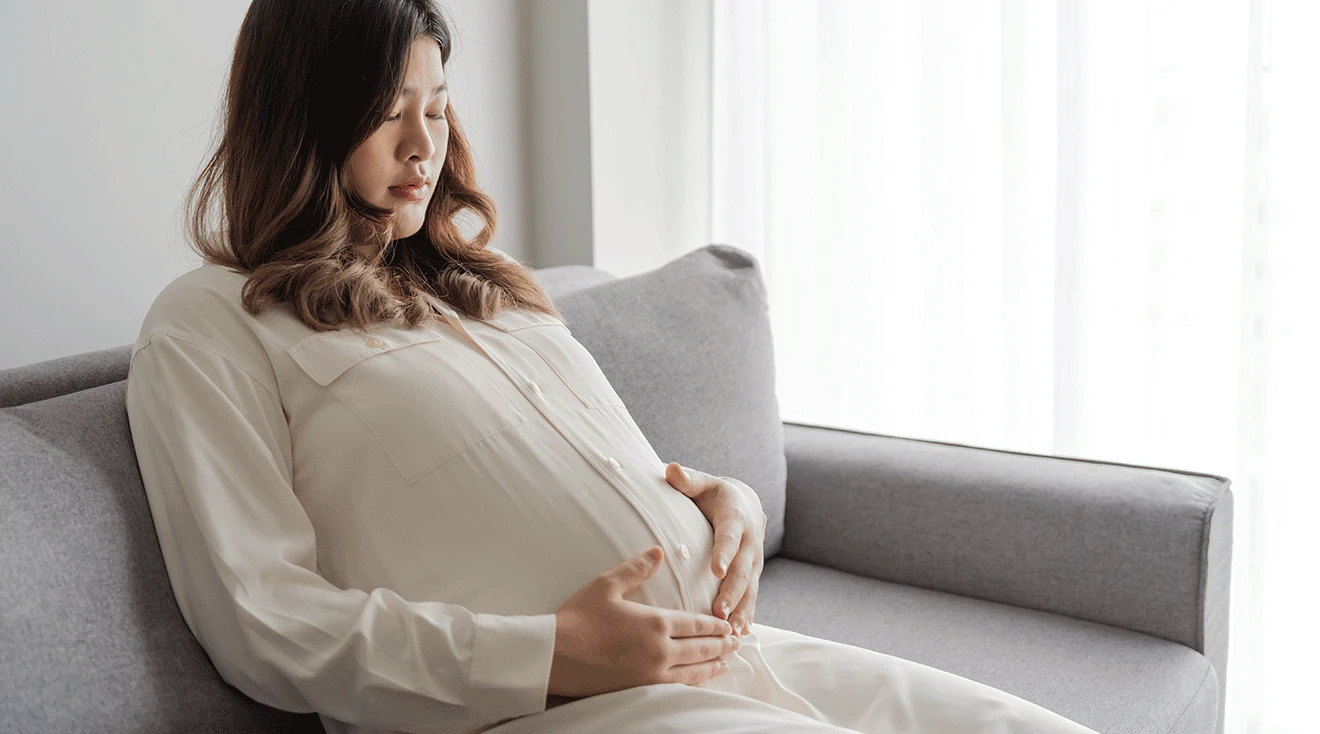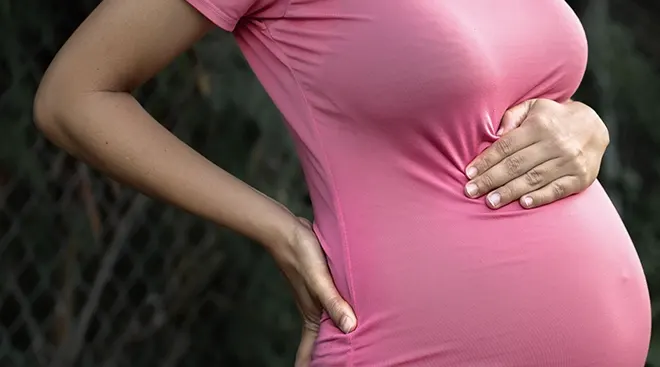What Causes Diarrhea During Pregnancy?
By now, you’re likely aware that pregnancy can cause a slew of changes in your body. Unfortunately, it can impact your bathroom habits too. But is diarrhea normal in early pregnancy or later on? While most pregnant women are more likely to experience constipation, pregnancy diarrhea can also happen, says G. Thomas Ruiz, MD, an ob-gyn at MemorialCare Orange Coast Medical Center in Fountain Valley, California. But what causes you to have diarrhea while pregnant—and how can you safely treat it? Here, doctors break down everything to know, along with when to alert your bowel habits to your provider.
- Experiencing diarrhea while pregnant is relatively common, especially as you near your due date.
- The causes of diarrhea during pregnancy can include increased food sensitivities, hormonal changes, reactions to new vitamins and supplements, dietary changes and infections.
- If you do have a bout of diarrhea in pregnancy, it’s important to stay hydrated and follow a simple diet.
- Reach out to your provider for safe medication options.
Experiencing watery stools and wondering: Could I be expecting? A positive pregnancy test is the most reliable way to determine pregnancy, says Christine Greves, MD, an ob-gyn at the Winnie Palmer Hospital for Women and Babies in Orlando, Florida. That said—in theory—diarrhea could tip you off as it can be an early sign of pregnancy caused by fluctuating hormone levels. “Everybody reacts differently,” Greves says. That said, Ruiz says you’re more likely to experience constipation rather than diarrhea very early on. In any case, suffice it to say that diarrhea is probably not going to be the very first sign of pregnancy a woman experiences.
Does pregnancy cause diarrhea? While constipation is more likely, it might. Diarrhea in early pregnancy is usually caused by hormonal changes and shifts, explains Sherry Ross, MD, an ob-gyn and women’s health expert. Specifically, levels of progesterone (the hormone that helps maintain pregnancy) rise in early pregnancy and slow down intestinal motility. This—combined with any reactions to new prenatal vitamins and dietary supplements—can create changes in bowel movements, such as diarrhea and constipation. “[Both] can occur as early as the first trimester and continue throughout the duration of pregnancy,” Ross notes.
Some other causes of diarrhea in early pregnancy? Dietary changes and increased sensitivity to certain foods, the American Pregnancy Association (APA) notes. “If you already have a known diagnosis of irritable bowel syndrome (IBS), you may have a history of irregular bowel habits including constipation, diarrhea or both,” Ross adds.
There are a lot of potential reasons why you may experience diarrhea later on in pregnancy. In fact, the cause may be “multifactorial,” says women’s health expert Jennifer Wider, MD. Along with the above reasons for diarrhea in pregnancy, another big cause is food poisoning or an infection. Ruiz notes that diarrhea in pregnancy usually occurs due to mild viruses that cause gastroenteritis (i.e. stomach bugs). “Most adults get them from kids,” he adds. “There are also the more dangerous infectious forms of diarrhea, which anyone can get, like C. Difficile, but it’s very rare during pregnancy and usually occurs in someone who has been on an antibiotic for some other disorder.”
As you approach your due date, you may also experience diarrhea as a sign that your body’s preparing for labor, per the APA.
While there are a few treatment options for diarrhea in pregnancy, the right option ultimately comes down to how you feel and how your symptoms are affecting your day-to-day life, says Greves. Of course, in some instances, diarrhea during pregnancy “may resolve on its own” without the need for medication, Wider adds.
Home remedies for pregnancy diarrhea
As long as you don’t have any worrisome symptoms, like severe pain or a fever (in which case, call your doctor), the biggest thing to keep in mind when treating diarrhea in pregnancy is to avoid dehydration and replenish your fluids. “It’s important to stay hydrated because a lot of fluid is lost through multiple bouts of diarrhea,” Wider says. If you’re experiencing mild nausea or vomiting, it’s also helpful to sip a drink with electrolytes, like Pedialyte or Gatorade. “Typically, if you’re having nausea and vomiting as well, you want to try to have a tablespoon of liquid every five minutes until you can start to hold stuff down,” Ruiz says.
Plus, you’ll want to eat a diet that bulks up your poop and is gentle on your bowels. Wider recommends following a BRAT diet (which stands for bananas, rice, applesauce and toast), while Greves suggests avoiding dairy products and excessive sugar. Ross notes consuming foods with a high-water content in moderation, such as watermelon, cucumbers, celery, tomatoes, strawberries and melons can also be helpful.
What medications are safe for treating diarrhea in pregnancy?
First, it’s a good idea to consult your doctor before taking any new medication in pregnancy, just to be safe. Your provider may recommend that you try to sit tight to see if things improve. “Generally speaking, you let diarrhea run its course,” Ruiz says. ‘It’s usually short-lived.”
But if you’re really struggling, your doctor may give the thumbs up to take loperamide—the active ingredient in Imodium—which, according to studies, is generally considered safe to use in pregnancy. Other research suggests that probiotics may also be helpful, but you’ll want to get the okay from your doctor.
Usually diarrhea in pregnancy will resolve on its own. However, Greves and Ross recommend contacting your doctor if it’s lasting for more than a few days, or if you’re dealing with additional symptoms, such as:
- High fever
- Chills
- Nausea and vomiting
- Blood in your stool
- Pain
- Dehydration
- Dizziness
- Severe weakness
- You’re not able to keep anything in
Additionally, if you experience diarrhea in pregnancy following antibiotic treatment, reach out to your provider for guidance.
Frequently Asked Questions
What are the symptoms of diarrhea while pregnant?
The symptoms of diarrhea in pregnancy are the same as they are outside of pregnancy. According to Ross, these include having three or more watery stools per day, abdominal cramps and bloating.
If you’re experiencing persistent diarrhea, you’ll also want to look out for signs of dehydration, such as a dry mouth, darker colored urine, increased thirst and dizziness, Ross adds.
Is diarrhea in early pregnancy a sign of miscarriage?
Not necessarily—you can have diarrhea for a range of reasons, including viral illnesses and simply eating something that didn’t agree with you, Ruiz says. On the other hand, he notes that high levels of prostaglandins— which drive uterine contractions—can lead to loose stools. In other words, it could potentially be a symptom that your progesterone levels are dropping and that your uterus is starting to contract. However, it's not a reliable sign [of miscarriage], nor is it a reason to panic. “Oftentimes diarrhea during a pregnancy isn't the sign of something wrong,” Wider agrees.
Is it normal to have green poop while pregnant?
“A change in the color of stool can normally occur during pregnancy,” Ross notes. This is due to dietary changes, hormonal shifts and prenatal vitamins. You might also experience green stools after eating lots of green vegetables. That said, she adds that some green poop may also be caused by infections and accompanied by diarrhea and cramping. If you experience symptoms of an infection, reach out to your provider.
What foods may cause or exacerbate diarrhea in pregnancy?
According to Harvard Health, foods that exacerbate diarrhea include sugars, dairy, gluten, artificial sweeteners, fried foods, spicy foods and caffeine. Plus, Ross adds to steer clear of the following during pregnancy, as they can cause foodborne illness: unwashed raw vegetables; unpasteurized juices; deli meats; seafood high in mercury and undercooked poultry, seafood or eggs.
What are other common stomach problems during pregnancy?
Other common stomach issues during pregnancy include constipation, bloating and heartburn. You may also experience mild cramps as the uterus grows, Ross says.
Please note: The Bump and the materials and information it contains are not intended to, and do not constitute, medical or other health advice or diagnosis and should not be used as such. You should always consult with a qualified physician or health professional about your specific circumstances.
Plus, more from The Bump:
Christine Greves, MD, FACOG, is an ob-gyn at the Winnie Palmer Hospital for Women & Babies in Orlando. She received her medical degree from the University of South Florida College of Medicine.
Sherry Ross, MD, is an ob-gyn, women’s sexual health expert and author of She-ology: The Definitive Guide to Women’s Intimate Health. Period. and She-ology, The She-quel. She earned her medical degree from New York Medical College.
G. Thomas Ruiz, MD, is an ob-gyn at MemorialCare Orange Coast Medical Center in Fountain Valley, California. He earned his medical degree at UC Irvine School of Medicine in California.
Jennifer Wider, MD, is a nationally renowned women’s health expert and author. She earned her medical degree from the Mount Sinai School of Medicine in New York City.
American Pregnancy Association, Diarrhea During Pregnancy
Canadian Journal of Gastroenterology and Hepatology, Prospective, controlled, multicentre study of loperamide in pregnancy, March 2000
International Journal of Molecular Sciences, Effects of Probiotic Supplementation during Pregnancy on the Future Maternal Risk of Metabolic Syndrome, August 2022
Harvard Health, Is something in your diet causing diarrhea?, August 2023
Learn how we ensure the accuracy of our content through our editorial and medical review process.
Navigate forward to interact with the calendar and select a date. Press the question mark key to get the keyboard shortcuts for changing dates.




















































